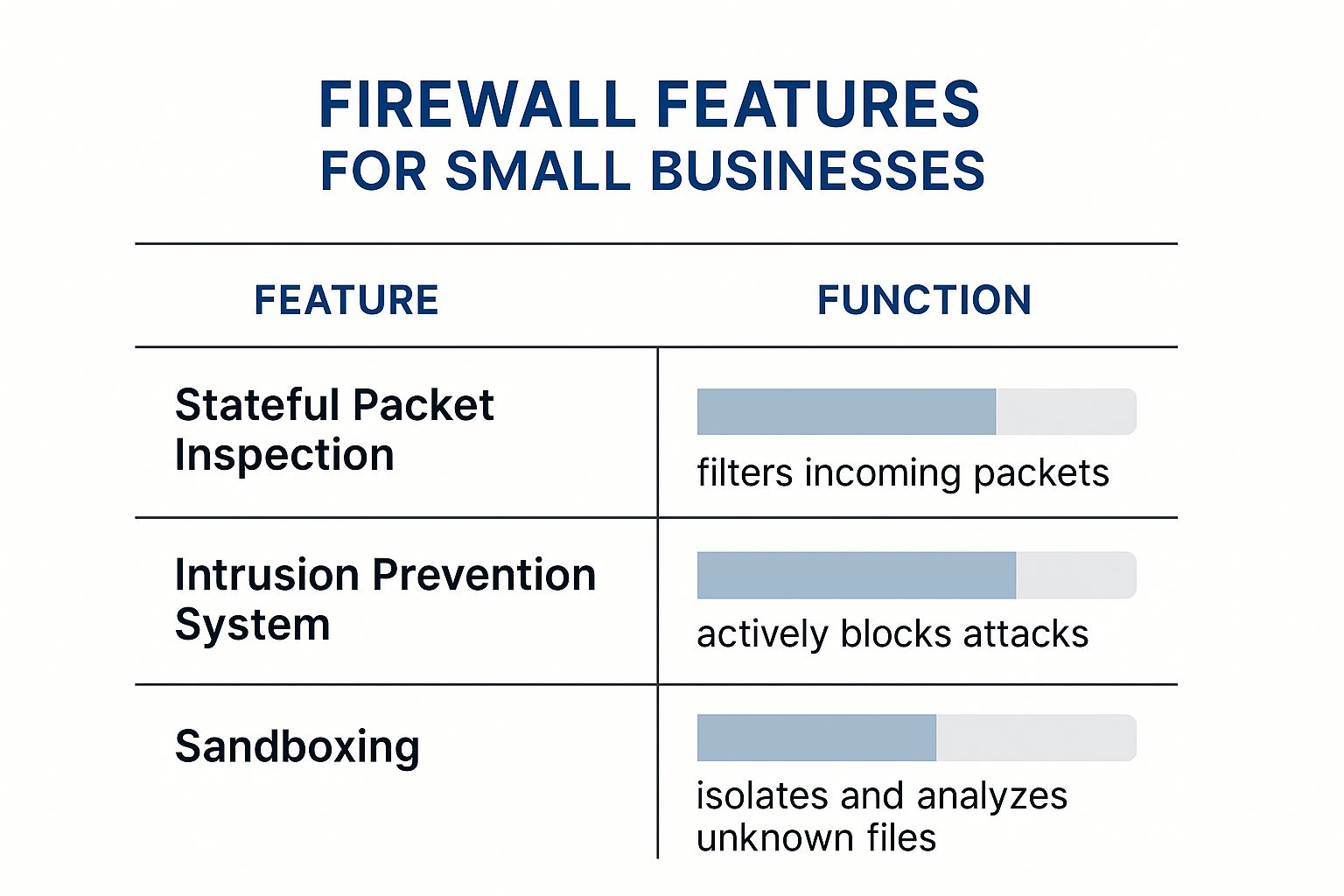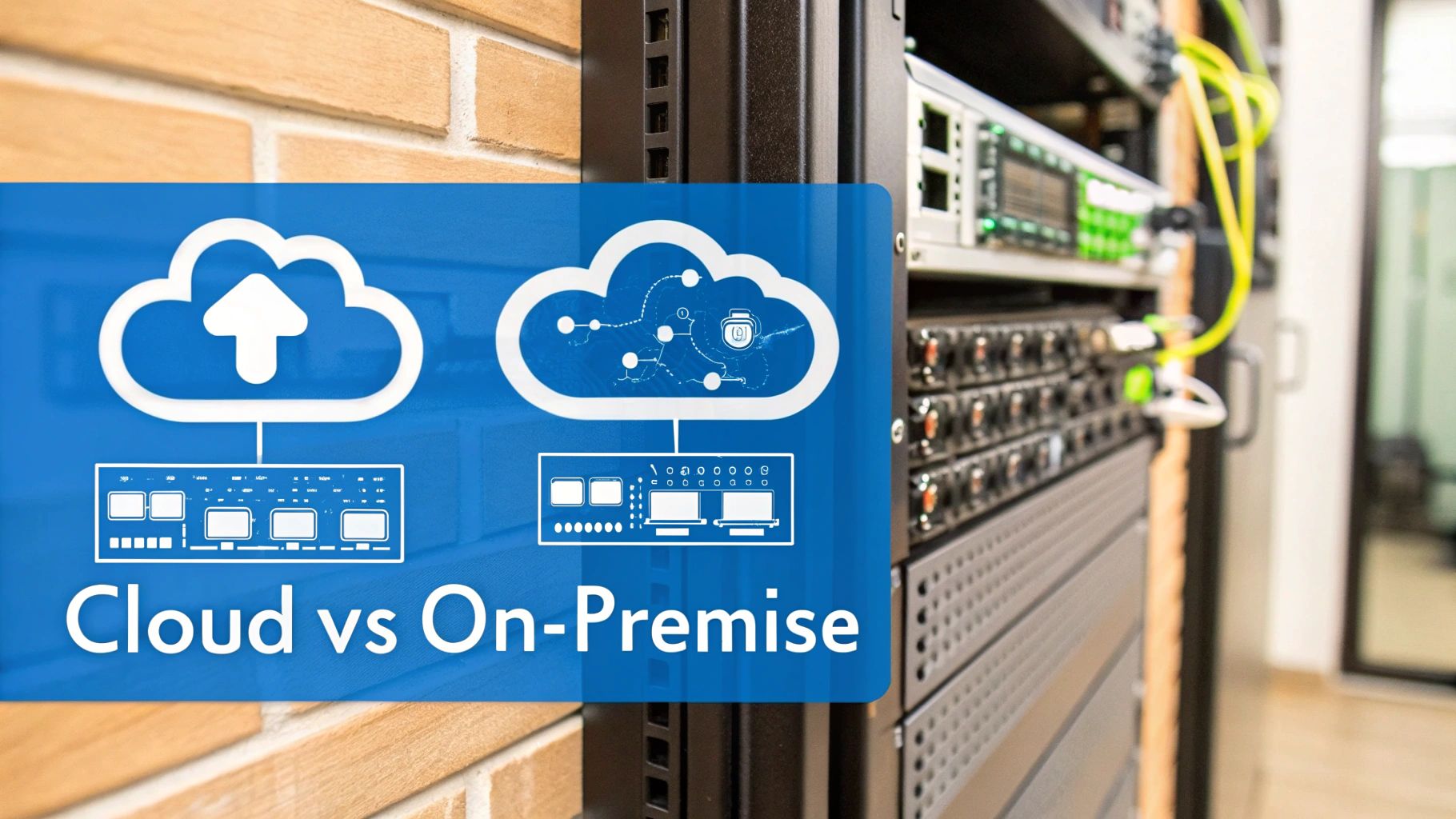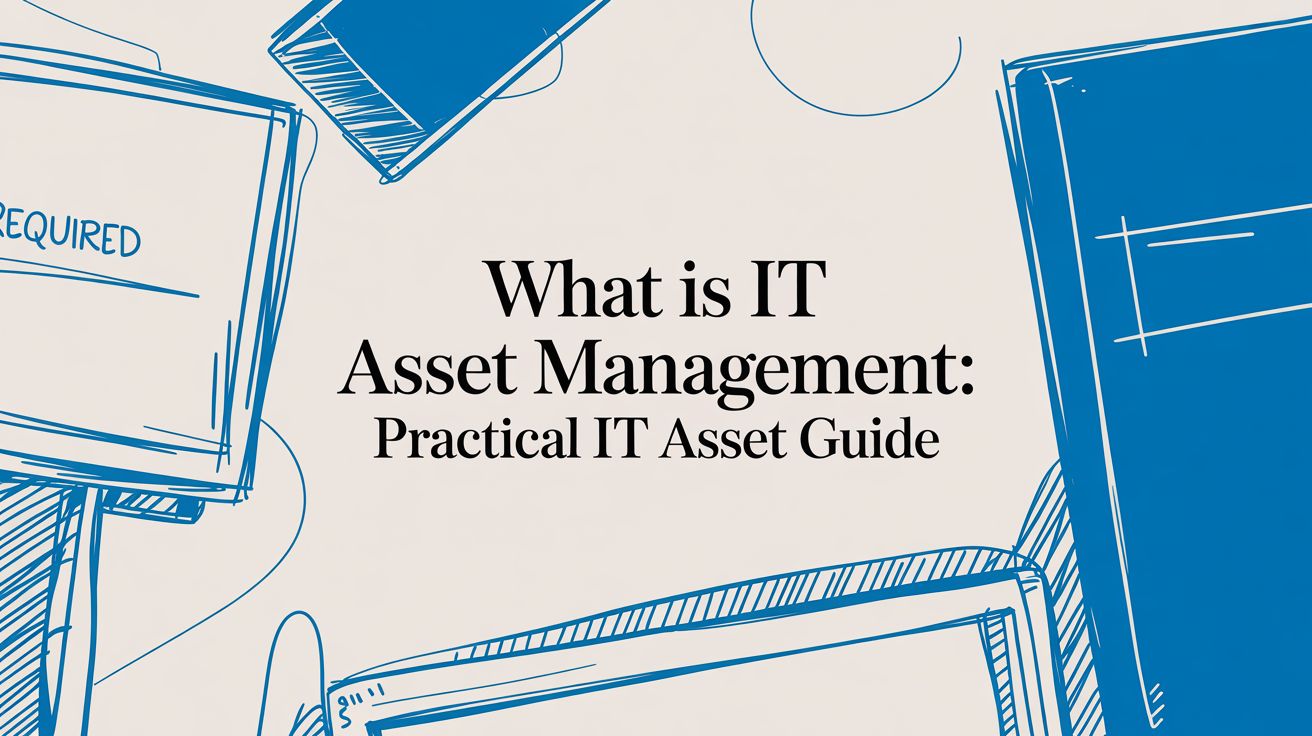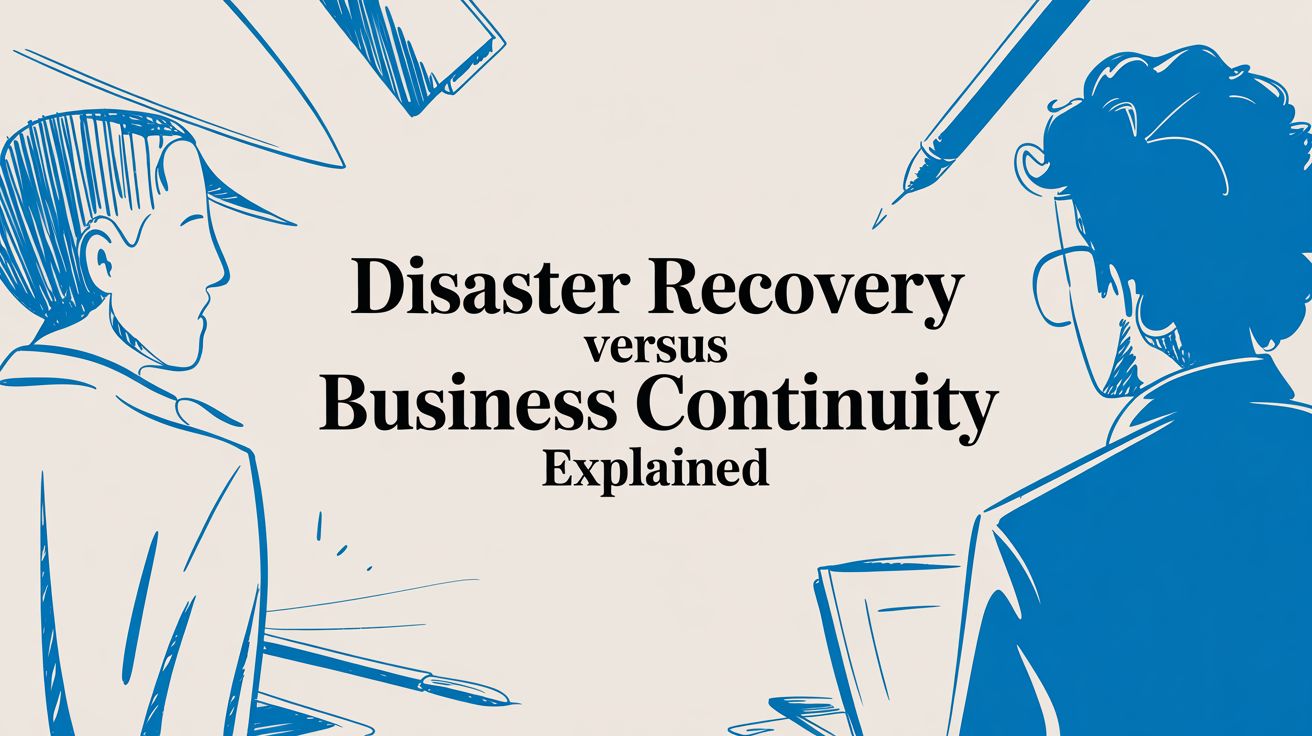Choosing the Best Firewall for Your Small Business: A Strategic Guide
The best firewalls for a small business are more than just a digital gatekeeper; they are the proactive foundation of a modern cybersecurity strategy. Today’s solutions, from industry leaders like Fortinet, Cisco Meraki, and Palo Alto Networks, offer layered security with built-in intrusion prevention and real-time threat intelligence designed to stop sophisticated cyberattacks before they impact your operations. For any company serious about protecting its data and reputation, a next-generation firewall isn’t an option—it’s a necessity.
Why Your Business Needs More Than a Basic Firewall
A common question we hear from business owners is, "Isn't the firewall in my router good enough?" While it provides a minimal line of defense, relying solely on it is a dangerously outdated mindset. Cybercriminals actively target small and mid-sized businesses, knowing that security is often an afterthought. This makes SMBs easy, profitable targets. Reports show that a staggering 94% of small businesses have been hit by at least one cyberattack, proving that hope is not a strategy.
The problem is that a basic firewall mostly just filters packets. It looks at the address of incoming and outgoing data but doesn't inspect the contents. This leaves gaping holes for sophisticated threats to walk right through your network's front door.

The Rise of Advanced Threats
Today's cyber threats are specifically engineered to bypass simple security. A basic router firewall is often completely blind to:
- Ransomware that can encrypt your critical business data, grinding your operations to a halt until you pay a hefty ransom.
- Phishing attacks designed to trick your employees into revealing credentials and granting access to sensitive systems.
- Zero-day exploits, which are new vulnerabilities that haven't been patched yet, allowing attackers to bypass traditional defenses.
This is exactly why a more advanced solution is critical. It's also important to understand the different roles of your security tools. For a clear breakdown, check out this guide on Firewall vs. Antivirus: Know the Difference. In short, antivirus protects a single device, while a next-generation firewall guards your entire network.
Next-Generation Firewalls: A Modern Necessity
To defend against these evolving threats, businesses must adopt a Next-Generation Firewall (NGFW) or a Unified Threat Management (UTM) appliance. These systems provide comprehensive, layered security that makes simple packet filtering look like a screen door on a submarine.
An NGFW is like an intelligent security guard for your network. It doesn't just check IDs at the gate; it inspects the contents of every package, watches for suspicious behavior, and actively stops threats before they cause damage.
These modern firewalls come packed with critical capabilities:
- Intrusion Prevention Systems (IPS): Actively identifies and blocks malicious network activity in real time.
- Deep Packet Inspection (DPI): Analyzes the actual content of your data traffic for hidden threats, like malware embedded in a seemingly innocent file.
- Application Control: Allows you to define which specific programs and applications are permitted to run on your network, preventing unauthorized software from creating vulnerabilities.
- Web Content Filtering: Blocks access to dangerous or inappropriate websites, a primary vector for phishing and malware.
Here’s a real-world example of why this matters. A Dallas-based accounting firm we partner with was being targeted by sophisticated phishing emails. Their standard router firewall was completely ineffective. Once we implemented a managed NGFW, we could block the malicious domains at the network perimeter. The dangerous links never even reached their employees' inboxes. That one proactive step prevented a potential data breach that could have destroyed their reputation and cost them tens of thousands in recovery and fines.
Key Firewall Features Every Small Business Needs
Moving beyond a basic firewall means getting serious about what actually protects your business. Modern cyber threats are sophisticated, so your defenses must be, too. The best firewalls for small businesses today are loaded with intelligent features that proactively hunt down and neutralize dangers before they can do any damage. It's no longer just about blocking traffic; it's about deep analysis and automated intervention.
Think of it like this: instead of a single guard at the gate, these features give you a full security team. One expert inspects the contents of every package, another patrols the perimeter for suspicious behavior, and a third isolates anything unknown in a secure room for analysis.
Stateful Packet Inspection: The Foundation of Smart Filtering
At its core, any worthwhile firewall starts with Stateful Packet Inspection (SPI). Unlike older, "stateless" firewalls that examine each piece of data in isolation, SPI remembers the context. It maintains a table of all active connections, allowing it to understand the entire "conversation" between your computer and a server on the internet.
This means it knows that an incoming data packet is a legitimate response to a request an employee just made. That contextual awareness lets it make smarter, faster decisions—waving through authorized traffic while blocking unsolicited data. Without SPI, a firewall operates with no short-term memory, making it far less effective at distinguishing good from bad.
Intrusion Prevention Systems: Your Active Network Defender
While SPI is the foundation, an Intrusion Prevention System (IPS) is what elevates your security from passive to active. An IPS doesn't just filter data; it actively scans network traffic for malicious activity patterns and known attack signatures.
When it spots a potential threat—like a hacker attempting to exploit a known software vulnerability—it doesn't just log an alert. It actively blocks the connection in real time. For example, if a cybercriminal tries to use a common exploit to gain access to one of your servers, the IPS recognizes the attack's signature and terminates the connection instantly. The breach is stopped before it even begins.
An IPS is the crucial difference between a simple alarm system and an on-site security detail that intervenes the moment a threat appears. It’s a proactive defense that stops attacks in their tracks.
Sandboxing and Advanced Threat Protection
But what about brand-new threats—the "zero-day" attacks that have no known signature? This is where sandboxing becomes an essential component of modern cybersecurity. When your firewall encounters an unknown file or link, it doesn't take a chance. It sends the suspicious item to a secure, isolated virtual environment—the sandbox—to be safely executed and analyzed.
Inside this digital quarantine, the file's behavior is closely monitored. If it attempts to encrypt files (a hallmark of ransomware), contact a malicious command-and-control server, or exploit a vulnerability, the firewall flags it as malicious. Once confirmed, the threat is blocked from ever entering your network, and its signature is added to your defense database to protect against it in the future.
This infographic breaks down how these three core features work together to provide layers of protection.

As you can see, SPI provides the essential filtering, but it's the IPS and Sandboxing that deliver the proactive, intelligent defense needed to stop today's advanced attacks.
Essential Features for the Modern Workforce
Beyond pure threat detection, the best firewalls must support how we work today. Two non-negotiable features for any small business are:
- VPN Support: Secure Virtual Private Network (VPN) capabilities are essential for protecting remote and traveling employees. A firewall with a built-in VPN allows your team to create an encrypted tunnel from any location directly to your office network, ensuring all company data remains confidential and secure.
- Web Content Filtering: This feature empowers you to enforce your company's security policies by blocking access to malicious, inappropriate, or unproductive websites. It's a critical tool for preventing phishing attacks and also helps maintain focus and productivity.
These features work best as part of a larger, layered security strategy. A firewall provides a strong perimeter, but that defense is amplified by tools that protect individual devices. To understand this comprehensive approach better, explore the benefits of a robust Endpoint Detection and Response solution.
A Head-to-Head Look at Top Firewalls for Small Businesses
Choosing the right firewall isn’t about picking the one with the most features. It’s about finding the technology that aligns with your specific business needs, budget, and growth plans. Industry leaders like Fortinet, Cisco Meraki, and Palo Alto Networks all deliver top-tier protection, but each excels in different environments.
For instance, a Dallas-based retail chain with multiple storefronts needs simple, centralized management. In contrast, a manufacturing plant in Memphis with critical on-site industrial controls requires a firewall that prioritizes raw performance and low latency. Let's explore what sets these top contenders apart.
Fortinet FortiGate: The Performance Powerhouse
Fortinet’s FortiGate series is renowned for its exceptional speed, thanks to its custom-built security processing units (SPUs). These are specialized chips designed to handle security tasks without slowing down your network—a critical advantage for any business that moves large amounts of data.
This makes FortiGate the ideal choice for companies where network performance is non-negotiable. Imagine a medical imaging center transferring massive MRI or CT scan files. Lag is not an option. FortiGate’s ability to perform deep packet inspection without creating a bottleneck ensures their critical work continues securely and without interruption.
- Best For: Businesses that need high-throughput security, such as manufacturing, healthcare, or financial firms where performance is as crucial as protection.
- Management Style: It offers highly detailed, on-premise control with its FortiOS operating system, along with a cloud management option. This hybrid approach is perfect for businesses with skilled IT staff who want to customize every detail.
- Key Differentiator: The custom SPU hardware, which provides an enterprise-level performance-to-price ratio that is accessible to SMBs.
Cisco Meraki MX: Cloud-Managed Simplicity
Cisco Meraki revolutionized network management with its intuitive, cloud-based platform. The Meraki MX series is designed for businesses that want powerful security without the complexity of traditional network hardware. An administrator can manage firewall rules, VPNs, and network status across hundreds of sites from a single web dashboard.
This "plug-and-play" approach is a game-changer for businesses with multiple locations. Consider a property management company with offices across Dallas and Memphis. With Meraki, they can ship a new firewall to a new office, have it plugged in, and watch it automatically download its configuration from the cloud. It’s operational in minutes, drastically reducing the need for on-site IT support.
The real magic of Meraki isn't just the firewall itself—it's the operational efficiency. It empowers businesses with lean IT teams to manage a sophisticated, enterprise-grade security posture with remarkable ease.
Palo Alto Networks: The Security Innovator
When it comes to pure security innovation, Palo Alto Networks consistently leads the industry. Their solutions are laser-focused on stopping sophisticated, zero-day threats before they can cause damage. The PA-Series firewalls leverage machine learning to identify and shut down unknown malware in real time, offering a more proactive defense.
This is vital for organizations that are high-value targets. A law firm, for example, is constantly defending against advanced attacks aimed at stealing sensitive client data. Palo Alto’s technology can analyze unknown files in a secure sandbox and use AI to predict malicious intent—a defensive layer that many other solutions can't match. While it's often a premium investment, for a business where a single breach could be devastating, the value is clear.
- Best For: "Security-first" organizations in high-risk sectors like legal, finance, or technology that require the most advanced threat prevention available.
- Management Style: Its Panorama centralized management platform offers deep visibility and granular policy control, making it a favorite among dedicated security professionals.
- Key Differentiator: Its machine learning-powered threat intelligence engine, WildFire, which is a powerhouse for catching brand-new, never-before-seen attacks.
Small Business Firewall Feature Comparison
To simplify your decision, here’s a quick comparison of how these top providers stack up for the small business space.
This table highlights the core philosophy of each provider. Fortinet prioritizes speed, Meraki focuses on ease of use, and Palo Alto excels in cutting-edge threat defense. Your choice depends on which of these priorities aligns most closely with your business needs.
How to Make the Right Choice
The "best" firewall is always the one that fits your specific situation. A small e-commerce startup might thrive with the all-in-one value of a Unified Threat Management (UTM) appliance. Meanwhile, a growing consulting firm with a distributed workforce would gain more from the scalable, cloud-first approach of Meraki. For a deeper dive into product specifics, you can find more comparisons of the top firewall for small business solutions to see how different models compare.
Remember to consider the total cost of ownership. The upfront hardware price is just the beginning. You must also factor in ongoing subscriptions for security services (like threat updates and web filtering), licensing, and the cost of management. Understanding the full managed IT services cost will provide a more realistic view of the long-term investment.
Ultimately, your decision should be based on three pillars: your security requirements, your operational capacity, and your budget. A partner like PWR Technologies can guide you through this process. We will assess your unique environment and business goals to recommend and implement a firewall solution that delivers true protection and lasting value.
Choosing Between On-Premise and Cloud-Managed Firewalls
One of the first major decisions when selecting a firewall for your small business is choosing between a traditional on-premise hardware appliance and a modern, cloud-managed solution. There is no single correct answer; the best fit depends entirely on your company’s operations, IT resources, and security needs.
An on-premise firewall is a physical box located in your server closet. It's a dedicated piece of hardware acting as a gatekeeper between your internal network and the outside world, processing all traffic on-site.
Conversely, a cloud-managed firewall, often called Firewall-as-a-Service (FWaaS), allows you to handle all configuration and management from a web dashboard. While you may still have hardware in your office, the heavy lifting—like policy updates and threat monitoring—is done in the cloud. This dramatically simplifies day-to-day administration.

The Case for On-Premise Hardware Firewalls
An on-premise firewall has long been the standard for businesses requiring absolute control and top-tier performance at a single location. Since the hardware is physically in your building, it can process large volumes of internal traffic with minimal latency, which is a game-changer for data-intensive operations.
This setup is a natural fit for businesses like:
- Manufacturing Plants: Where split-second timing is critical for industrial control systems.
- Healthcare Clinics: Businesses in Dallas or Memphis needing direct oversight of locally stored patient data to maintain HIPAA compliance.
- Financial Services Firms: Companies that require total control over their security policies and traffic routing for regulatory reasons.
However, this control comes at a cost. On-premise firewalls demand a significant upfront investment in hardware. Furthermore, they require dedicated IT expertise for initial setup, ongoing maintenance, and critical security patching.
An on-premise firewall is like owning your own security command center. You have complete control, but you are also responsible for everything—from upkeep and staffing to staying ahead of new threats.
The Advantages of Cloud-Managed Firewalls
Cloud-managed firewalls have become the go-to choice for modern businesses, especially those with remote teams, multiple locations, or limited IT staff. The primary benefit is efficiency; the management burden shifts from your team to a clean, user-friendly cloud dashboard.
The market growth reflects this shift. The Firewall-as-a-Service (FWaaS) market is projected to grow from $5.43 billion in 2025 to $11.52 billion by 2030. This trend highlights a fundamental move toward models where security providers handle the backend complexity, freeing businesses to focus on their core objectives. You can see more details in the global FWaaS market report.
Key benefits of a cloud-managed firewall include:
- Simplified Management: Adjust policies, monitor for threats, and manage multiple offices from a single browser tab.
- Rapid Scalability: Easily add a new branch office or dozens of remote users without complex hardware deployments.
- Lower Upfront Costs: Cloud solutions are typically subscription-based, turning a large capital expense into a predictable operating expense.
This makes cloud-managed firewalls a perfect fit for any growing business, especially those with multiple offices or a commitment to remote work.
Real-World Scenario: Choosing the Right Firewall
Consider a growing consulting firm in Dallas with 30 employees. They started in a single office with a traditional on-premise firewall, which worked well initially. But as they expanded, half the team began working from home, and they opened a satellite office in Memphis.
Suddenly, their on-premise firewall became a major operational bottleneck. Managing VPN access for remote workers was cumbersome, and securing the new office required purchasing and configuring a second firewall, effectively doubling the management workload.
They switched to a managed, cloud-based solution, which delivered three immediate business outcomes:
- Centralized Control: They could finally manage security for both offices and all remote employees from a single, unified platform.
- Improved Security Posture: Consistent security policies were applied instantly across the entire company, ensuring uniform protection regardless of location.
- Reduced IT Burden: The internal team was freed from the daily grind of manual updates and VPN troubleshooting, allowing them to focus on strategic IT projects.
This example illustrates why your firewall strategy must align with your business strategy. For companies built on flexibility and growth, seeking expert guidance on infrastructure and cloud solutions is the best way to ensure your security can keep pace.
The Strategic Value of Managed Firewall Services
Choosing the right firewall is a critical first step, but it’s only half the battle. Even the most advanced firewall is only as effective as its configuration and ongoing management. This is where partnering with a managed IT services provider becomes a strategic advantage, transforming a powerful piece of hardware into an active, intelligent shield for your business.
Expert management unlocks the full potential of your security investment. Without it, even a top-of-the-line firewall can quickly become outdated or misconfigured, leaving your business vulnerable to the very threats you sought to prevent. Cybersecurity is not a "set it and forget it" task; it's a continuous process of monitoring, updating, and adapting.

Beyond the Box: What a Managed Firewall Delivers
Partnering with a Managed IT Service Provider (MSP) like PWR Technologies elevates your firewall from a simple appliance to a fully managed security service. This proactive approach delivers tangible business outcomes that a self-managed device cannot.
Instead of your team struggling to interpret security alerts and keep up with patches, you gain a dedicated partner whose sole focus is optimizing your defenses around the clock. The benefits of a managed service include:
- 24/7 Expert Monitoring: Threats don’t operate on a 9-to-5 schedule. A managed service provides constant vigilance, with security professionals ready to respond to suspicious activity the moment it’s detected.
- Professional Rule-Set Management: Firewall rules are complex and require regular fine-tuning. Experts ensure your policies block malicious traffic without disrupting legitimate business operations—a common issue with DIY management.
- Proactive Security Patching: Cybercriminals move quickly to exploit new vulnerabilities. A managed service ensures your firewall firmware and threat definitions are always up-to-date, closing security gaps before attackers can find them.
- Clear, Actionable Reporting: You receive straightforward reports that translate complex technical data into meaningful business insights, helping you understand your security posture and demonstrate compliance.
A managed firewall service shifts the heavy lift of network security from your shoulders to a team of dedicated experts. It’s the difference between buying a high-performance car and having a professional pit crew to keep it running at peak condition.
Real-World ROI: A Logistics Company’s Compliance Story
Consider a mid-sized logistics company in Memphis that handles sensitive shipping manifests and must meet strict industry compliance standards. They invested in a powerful next-generation firewall but tasked their already-overwhelmed office manager with its administration.
Within months, it was clear this approach wasn't working. Firewall rules were applied inconsistently, critical security patches were missed, and they struggled to generate the compliance reports their partners required. After a phishing attack nearly succeeded—an attack their firewall should have easily blocked—they knew a change was needed.
The impact of switching to our managed firewall service was immediate. Our team reconfigured their rule sets for optimal security, implemented a strict patch management schedule, and deployed automated monitoring. The company not only achieved full compliance within weeks but also gained complete visibility into their network traffic through clear monthly reports.
This move allowed them to focus on their core business—logistics—while we handled their security. The tangible ROI was not just in avoiding a costly data breach but also in the operational efficiency and peace of mind they reclaimed. For a deeper look into how outsourcing IT can drive growth, our guide on IT managed services offers more examples. By leveraging professional expertise, they transformed their firewall from a source of stress into a true business enabler.
A Few Common Questions About Small Business Firewalls
Selecting the right firewall often raises some important questions. Here are the most common ones we hear from business owners, broken down to provide practical insights for strengthening your network security.
What's the Real Difference Between a Firewall and Antivirus Software?
This is an excellent question because you absolutely need both working in tandem as part of a layered security strategy. The simplest analogy is to think of your business network as your physical office building.
- A firewall is the security guard at the front door. It’s your first line of defense, inspecting everything trying to enter your network from the outside. It checks traffic, identifies known threats, and denies access to anything suspicious before it can get inside.
- Antivirus software functions like security cameras and patrols inside the building. It is installed on each endpoint (laptops, servers) and actively watches for malicious software that might have been brought in by an employee or slipped past the perimeter defense.
One protects the gateway to your entire network, while the other protects the individual devices within it. They are two critical, non-overlapping layers of a comprehensive security plan.
How Much Should a Small Business Budget for a Firewall?
Firewall costs vary, but it's helpful to break them down into three components:
- The Hardware: The upfront cost for a physical next-generation firewall (NGFW) appliance suitable for a small business typically ranges from $700 to $4,000. The price depends on its performance capabilities and the number of users it needs to support.
- The Subscriptions: This is an ongoing operational expense. You'll pay an annual fee for the essential security services that make the firewall intelligent, such as threat intelligence feeds, web filtering, and intrusion prevention. These licenses can range from $100 to over $1,000 per year.
- The Management: This represents the human expertise required for setup, 24/7 monitoring, and crucial updates. When you partner with a managed service provider (MSP), this expertise is bundled into a predictable monthly fee, which is almost always more cost-effective than hiring an in-house security specialist.
The true cost of a firewall isn't just the hardware. It's the total investment in hardware, software licenses, and the expert management required to ensure it is actually protecting your business.
How Often Do I Need to Update My Firewall Rules?
A firewall is not a "set it and forget it" device. Its rule set requires consistent attention to remain effective. Several factors will always necessitate an update:
- Business Changes: Rolling out a new cloud application or onboarding a new department requires rule adjustments to grant necessary access without inadvertently creating a security loophole.
- New Threats Emerge: When a new cyberattack makes headlines, your firewall rules may need to be updated to specifically block the new traffic patterns and indicators of compromise that hackers are using.
- Regular Audits: As a security best practice, your entire firewall rule set should be reviewed at least quarterly. This helps eliminate old, unnecessary rules that could become a liability over time.
This constant need for maintenance is a primary reason why so many small businesses opt for a managed firewall service. Having a dedicated team ensures your defenses adapt to both your business needs and the evolving threat landscape in real time, allowing you to focus on your work instead of your network security.
Ready to secure your network without the headache? The experts at PWR Technologies provide fully managed firewall solutions for businesses in Dallas and Memphis, ensuring your first line of defense is always strong. Contact us today for a complimentary security assessment.




